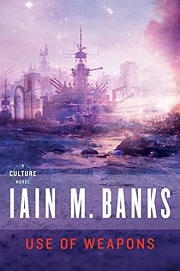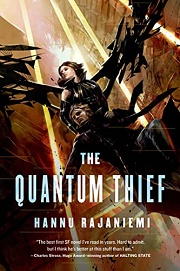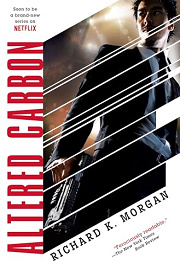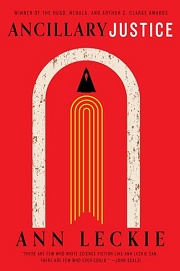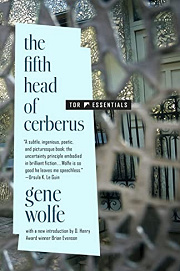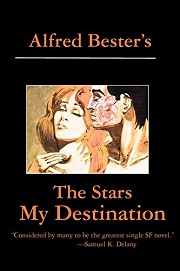Share your thoughts in a quick Shelf Talk!
Use Of Weapons by Iain Banks
An elite operative of the Culture takes on a mission that spirals through memories, loyalties, and the price of doing what’s "necessary." Brutal, elegant, and haunting, Use Of Weapons is a mind-bending space opera that asks whether the tools we wield end up shaping us.
Have you read this book? Share what you liked (or didn’t), and we’ll use your answers to recommend your next favorite read!
Love Use Of Weapons but not sure what to read next?
These picks are popular with readers who enjoyed this book. Complete a quick Shelf Talk to get recommendations made just for you! Warning: possible spoilers for Use Of Weapons below.
In Use Of Weapons, did you enjoy ...
... the fractured, puzzle-box structure that withholds identity and motive until the last possible moment?
The Quantum Thief by Hannu Rajaniemi
If the alternating forward/backward timelines and that final chair revelation in Use of Weapons hooked you, you’ll love Rajaniemi’s caper of memory heists and masked identities. Like Zakalwe’s past bleeding into his present while Diziet Sma and Skaffen-Amtiskaw maneuver him toward an endgame, Jean le Flambeur claws back stolen pieces of himself across exotic societies and mind-bending tech. It rewards the same patient, clue-hunting reading—every withheld truth snaps into place with delicious inevitability.
... a ruthless operative doing dirty jobs for powerful patrons while wrestling with what the mission makes of him?
Altered Carbon by Richard Morgan
Cheradenine Zakalwe’s brutal efficiency on Special Circumstances errands—and the moral fallout Sma keeps half-concealed—has a clear echo in Takeshi Kovacs. Like Zakalwe, Kovacs is a weapon aimed by others, shuttled between worlds to crack impossible problems, and forced to decide when the mission’s ends no longer justify the means. If you appreciated the razor-edged action, cynical wit, and ethically messy choices around interventions, this will scratch the same itch.
... the thorny ethics of intervention and authority—especially when AIs and empires decide what "civilizing" means?
Ancillary Justice by Ann Leckie
You watched Culture Minds and Special Circumstances play chess with peoples’ fates while Sma and the drone nudge Zakalwe toward outcomes that may or may not be righteous. Leckie dives deep into similar questions: What does a just intervention look like? Who gets to decide? As Breq navigates the Radch’s imperial machinery, you’ll find the same coolly argued dilemmas, sharp political maneuvering, and the uneasy sense that even benevolence can become a weapon.
... shocking identity reversals that reframe everything you thought you understood about the protagonist?
The Fifth Head Of Cerberus by Gene Wolfe
If the revelation about Zakalwe’s past—and what that infamous chair truly meant—left you re-scanning earlier chapters, Wolfe’s triptych will delight you. Across mirrored narratives on the twin worlds of Sainte Anne and Sainte Croix, the ground keeps shifting: doubles, imposture, and colonial myths collide until identity itself feels like a constructed weapon. It’s that same slow-burn dawning horror when a life story turns out to be a meticulously engineered mask.
... a ferocious character study of a broken man remade into something formidable and terrifying?
The Stars My Destination by Alfred Bester
Zakalwe’s transformation—from raw, damaged soldier to exquisitely honed instrument—carries the charge of watching willpower reforge a shattered psyche. Bester’s Gully Foyle is cut from a similar, mesmerizing cloth: fueled by trauma and obsession, he reshapes himself and the world around him with sheer, frightening intent. If you were gripped by the intimate, unsettling psychology beneath the Culture’s grand stage, Foyle’s metamorphosis will hit just as hard.
Unlock your personalized book recommendations! Just take a quick Shelf Talk for Use Of Weapons by Iain Banks. It’s only a few questions and takes less than a minute.
